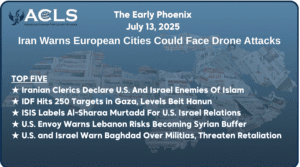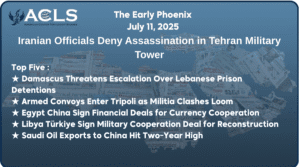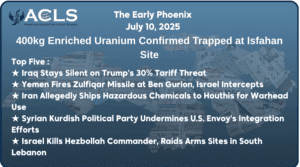Hamas Visits Tehran; Ceasefire Talks Collapse
TOP HEADLINES:
- US Denies Netanyahu’s Claim That UN Vote Impeded Hostage Negotiations
- Egypt Says Israel May Postpone Rafah Operation Until After Eid al-Fitr
- Iran’s Supreme Leader Hosts Hamas Leaders in Tehran
- Iraq and Russia Explore Nuclear Energy Cooperation
- Biden Invites Erdogan for White House Visit in May
=======================
★ ISRAEL & PALESTINIAN TERRITORIES
US Denies Netanyahu’s Claim That UN Vote Impeded Hostage Negotiations
The US State Department dismissed Prime Minister Benjamin Netanyahu’s assertion that a UN resolution for a Gaza ceasefire hampered Israeli hostage release efforts by Hamas. Spokesperson Matthew Miller labeled Netanyahu’s remarks as “unfair,” and said Hamas’s rejection of a proposed agreement in Qatar preceded the Security Council’s vote, which the US did not veto. Netanyahu criticized Hamas for refusing a US compromise and making “extreme demands.” The US reiterated its stance supporting Israel’s right to self-defense, emphasizing that Hamas must not govern Gaza and bears partial responsibility for Gazan civilians’ hardships.
Egypt Says Israel May Postpone Rafah Operation Until After Eid al-Fitr
Egypt has received indications that Israel plans to delay its potential military invasion of Palestinian Rafah until after Eid al-Fitr, expected in mid-April. Despite ongoing security communications, Israel has not disclosed its exact intentions regarding the operation. Cairo has been assured that any military action in Rafah would be precisely targeted.
Severe Blow to Palestinian Economy: Purchasing Power Plummets
The conflict in Gaza since October 7 continues to cast a shadow over the Palestinian economy, now facing one of the most significant downturns in its recent history, according to the World Bank. Despite the availability of basic goods at reasonable prices compared to previous years, Palestinians’ purchasing power has notably declined, affecting the economy severely. Factors contributing to this downturn include the impact on Palestinian workers in Israel, unpaid public sector salaries, and reduced private sector productivity. This situation has led to increased supply but decreased consumer demand.
Israel Withdraws Negotiators from Doha Due to Stalemate with Hamas
Israel has recalled its negotiators from Doha after declaring that ceasefire talks regarding Gaza have reached an impasse, primarily due to demands from Hamas. An official close to the Israeli intelligence agency Mossad, which is leading the negotiations, accused Hamas leader in Gaza, Yahya Sinwar, of sabotaging diplomatic efforts and escalating the conflict during Ramadan. Israel agreed to increase the number of Palestinian prisoners released in exchange for hostages to approximately 700-800 and allow some displaced Palestinians to return to northern Gaza. However, Prime Minister Netanyahu’s office has labeled Hamas’s demands—including a permanent cease fire and the withdrawal of all Israeli forces—as unrealistic, indicating a lack of interest in reaching an agreement on their part.
Colombian President Threatens to Sever Diplomatic Ties with Israel Over Ceasefire Non-Compliance
Colombian President Gustavo Petro has warned of breaking diplomatic relations with Israel if it fails to adhere to the UN Security Council’s resolution demanding an immediate ceasefire. This statement on X was met with strong criticism from Israeli Foreign Minister Israel Katz, who condemned Petro’s support for Hamas. Following the resolution, Hamas attacked Ashdod, launching rockets from a humanitarian center in Deir al-Balah, Gaza.
=======================
★ IRAN
Iran’s Supreme Leader Hosts Hamas Delegation, Pledges “Unwavering Support”
During a meeting in Tehran with Hamas Political Bureau Chief Ismail Haniyeh, Iran’s Supreme Leader Ali Khamenei praised Palestinian resilience against Israeli aggression. Khamenei highlighted global and Islamic solidarity with Gaza’s plight and commemorated slain Hamas leader Saleh al-Arouri. Haniyeh thanked Iran for its backing, presenting updates on Gaza’s ongoing conflict and stressing the severe impacts on the Israeli military, framing the situation as a global war with the U.S. as a principal accomplice.
Iran’s Oil Production Sees Incremental Rise in Early 2024
According to the International Energy Agency (IEA), Iran’s oil output increased by 50,000 barrels per day (bpd) in the first two months of 2024, contributing to a collective OPEC output rise of 140,000 bpd in February. The growth marks Iran, alongside Libya, Venezuela, and Saudi Arabia, as one of the key contributors to the expanded production, while Congo, Kuwait, and Nigeria experienced slight declines.
U.S. Sanctions Networks Supporting Iran, Hezbollah, Assad, and Houthis
The U.S. has sanctioned entities and individuals across six countries for facilitating transactions aiding Iran’s military efforts and groups like Hezbollah in Lebanon and the Houthis in Yemen. Actions include sanctioning six firms, two tankers, and a money exchanger in countries including Liberia, India, Vietnam, Lebanon, and Kuwait. These sanctions aim to curb activities benefiting these groups amid their involvement in regional conflicts, including attacks related to the Israel-Hamas war in Gaza and efforts to pressure Israel through Red Sea disruptions. Additionally, sanctions target individuals and entities supporting the Syrian government and the illicit Captagon trade, implicating ties to Bashar Assad and Hezbollah.
=======================
★ LEBANON
Israel Strikes Hezbollah Stronghold in Northeast Lebanon for the First Time
Israeli airstrikes hit the Hermel area, a Hezbollah stronghold in northeast Lebanon, marking the deepest attack into Lebanese territory in the ongoing conflict. The strikes, which were in retaliation for earlier attacks on Israeli surveillance units, targeted a military complex used by Hezbollah’s air unit. Additional targets included a military building and infrastructure near Aita al-Shaab and Kfarkila, as well as a reconnaissance site in Maroun al-Ras.
Lebanese Sunni Militant Group Joins Hezbollah in Battle Against Israel
Sheikh Mohammed Takkoush, leader of the Lebanese Sunni group al-Jamaa al-Islamiya, announced their cooperation with Hezbollah to combat Israel, motivated by the defense of Lebanese territories and solidarity with Gaza. This rare Sunni-Shiite collaboration highlights an increased coordination between Hamas and Hezbollah during the Israel-Hamas conflict.
=======================
★ YEMEN
Houthis Launch Six Attacks Against US and UK Ships
The Iranian-backed Houthis announced six military operations in 72 hours targeting American and British ships using drones and missiles. The operations focused on vessels in the Gulf of Aden and the Red Sea, marking an escalation in the Houthis’ maritime attacks. The attacks have expanded in scope since November to include the Indian Ocean, reflecting a broadened strategy against international shipping linked to Israel, the US, and the UK.
Houthi and Iranian Revolutionary Guard Secret Meeting Reveals New Maritime Tactics
A local news outlet reported that at a covert gathering in the Yemeni port city of Hodeidah, Houthi leadership and the Iranian Revolutionary Guard discussed plans for increased military actions in the Red and Arabian Seas, including reconnaissance, mining, and armed harassment of naval vessels. The meeting, led by a Houthi commander known as “Abu Sajad,” also outlined strategies involving the use of civilian fishermen as human shields. The meeting underlines the direct involvement of Iranian regime officials in these operations.
Houthis Target UAE Military Base with Missiles
Military sources from Sanaa confirmed a missile attack on a UAE-American military base on Yemen’s Zuqar Island, controlled by the Saudi-Emirati coalition in the Red Sea. The operation, yet to be officially announced by the Houthi Defense Ministry, marks an escalation in the conflict, with British maritime security firm Ambrey reporting explosions in the area. The attack came at the same time that Houthi-affiliated media claimed American-British strikes in the Houthi-controlled capital of Sanaa.
=======================
★ IRAQ
Iran-Backed Iraqi Militia Claims Drone Attacks on Israeli Military Sites
An Iraqi armed militia announced its drone strikes on two Israeli military locations, signaling an escalation in operations against Israel. The group, identifying itself as “The Islamic Resistance in Iraq,” claims it targeted the Speer military site and Avoda Air Base, citing retaliatory motives for Israeli actions against Palestinians.
Iraq and Russia Explore Cooperation in Nuclear Energy Development
Iraq’s Minister of Higher Education, Naeem Al-Aboudi, met with ROSATOM’s Alexey Likhachev to discuss using nuclear energy for peaceful purposes. As the country experiences power outages, Iraq aims to revive its nuclear program, halted since the destruction of its reactors over 30 years ago. The meeting underscores Iraq’s intent to construct a Zero-Energy Experimental Pile (ZEEP) reactor and a research reactor.
U.S. Allegedly Blocks Iraq’s Purchase of French Rafale Jets
An Iraqi security source revealed that the U.S. has obstructed Iraq’s acquisition of Rafale fighter jets from France to maintain U.S. dominance and influence over Iraq’s military capabilities. Iraqi sources claimed the move is an extension of the U.S.’s policy of hegemony, preventing Iraq from enhancing its air defense with advanced weaponry, especially from Eastern countries.
Baghdad and Washington Reaffirm Commitment to Combat ISIS
U.S. Secretary of State Antony Blinken and his Iraqi counterpart Fouad Hussein emphasized their ongoing partnership in the fight against ISIS, acknowledging that the group continues to pose a threat. This commitment was highlighted ahead of a strategic coordination meeting and the Iraqi Prime Minister’s upcoming visit to the U.S.
=======================
★ GULF REGION
GCC Calls for Complete International Recognition of Palestine
The Gulf Cooperation Council urged global recognition of Palestine with East Jerusalem as its capital, seeking urgent collective action for a permanent resolution. This call, articulated by Qatar’s UN delegate on behalf of the council, coincides with the Security Council’s vote on a ceasefire in Gaza amid Israel’s ongoing aggression, emphasizing the necessity for immediate humanitarian aid delivery without political manipulation. The council also highlighted the exacerbating hunger crisis and Israel’s legal accountability for civilian attacks, framing Israeli actions as part of a larger colonial settlement project against the Palestinian people.
=======================
★ EGYPT AND NORTH AFRICA
Saudi Company Signs a Deal to Boost Production in Egypt’s Aging Oil Fields
Ades International, a Saudi company, has finalized a long-term service agreement with the Egyptian General Petroleum Corporation to enhance production in aging oil fields in Egypt, planning investments of $30 million in SUCO fields and $36 million in OSUCO fields over the initial three years of the contract. The 10-year agreement, extendable by another decade, allows Ades to benefit from increased production revenues based on a pre-agreed mechanism. The deal anticipates a share of production increase between 61% and 72%, with an oil barrel reference price set according to market rates, and operations expected to commence within 90 days.
Egypt Allocates $1.5 Billion to Pay Outstsnding Bills to Foreign Oil Companies
The Egyptian government announced the initiation of payments towards the outstanding dues owed to foreign companies operating in the oil and gas sector, setting aside up to $1.5 billion for this purpose. A Cabinet statement revealed that about 20% of the backlogs are being cleared through a scheduled plan to gradually pay off all arrears. This move comes during a foreign currency shortage that had been exacerbating the arrears situation. The payment strategy coincides with Egypt’s financial reforms, including a significant investment deal, currency devaluation, and an increased loan from the IMF, aiming to settle billions in accumulated dues over the past decade.
=======================
★ SYRIA
Iran Mourns Revolutionary Guard Leader Killed in Deir ez-Zor Strike
Revolutionary Guard commander Behrouz Wahidi was honored in a funeral at the Sayyida Zainab shrine in Damascus, following his death in an airstrike in Deir ez-Zor, Syria. Mourners chanted anti-American slogans, blaming the U.S. for the attack, though the Pentagon denied any involvement in airstrikes in Syria that night.
Airstrikes in Deir ez-Zor Result in 49 Casualties
Airstrikes targeting areas in Deir ez-Zor and al-Bukamal under Syrian government control have resulted in 18 deaths, including a Syrian engineer working for the World Health Organization, and an Iranian Revolutionary Guard member. Iran’s embassy in Damascus and the IRNA news agency attributed the attack to Israel. The Syrian Observatory for Human Rights identified the deceased Iranian as a colonel and communications center advisor. Additionally, 31 individuals were injured, comprising 21 affiliated with Iranian groups and 10 civilians.
Renewed Attacks in Syrian Desert Raise Death Toll Among Truffle Gatherers
Over 110 truffle gatherers have been killed in Syria’s desert regions since the season began. Syrian state media and local sources report these incidents, highlighting the dangers in areas still littered with mines and targeted by militants, including presumed Iranian militias. Despite the Assad regime’s warnings against venturing into unsafe desert areas, the lucrative truffle season, with prices reaching up to 400,000 Syrian pounds per kilo, attracts many. However, land mines and militant attacks pose a significant threat.
Iranian-Syrian Economic Exchange Hits a Low Point
Despite expectations of a booming economic partnership, trade between Iran and Syria has significantly declined, with Iran expressing dissatisfaction over unmet trade expectations. A total trade value of $250 million out of Syria’s $5 billion imports falls short of Iran’s aspirations and reflects unfulfilled agreements and logistical issues. This downturn in economic relations contrasts starkly with the strong political and military alliance between the two countries.
Bahrain Invites Assad to Arab Summit in Manama
Syrian President Bashar al-Assad has received an official invitation from King Hamad bin Isa Al Khalifa to attend the 33rd session of the Arab League Summit in Manama, Bahrain, on May 16. This marks Assad’s second Arab League summit participation since 2010, signaling a thawing of relations with some Arab states. Following a period of diplomatic isolation due to Syria’s internal conflict, Bahrain and other Arab countries are gradually resuming ties with Damascus.
=======================
★ TURKIYE
Biden Invites Erdogan for White House Visit in May
President Recep Tayyip Erdoğan is set to visit the United States on May 9th, accepting an official invitation from President Joe Biden for discussions at the White House. This marks President Erdoğan’s first visit to Washington as Biden’s guest, with the meeting poised to address pivotal issues. Key topics include counter-terrorism efforts, the situation in Gaza, and defense cooperation, with particular emphasis on the F-16 supply and modernization process, as well as Turkey’s stance on Israel’s actions in Gaza and the ongoing support for a two-state solution. The leaders will also discuss Ankara’s discomfort over the U.S.’s support for YPG in northern Syria. The visit is seen as a reciprocal gesture for Turkish approval for Sweden’s accession to NATO.
Turkey and Hashd al-Shaabi Form Alliance Against PKK in Sinjar
Turkey reportedly has forged an alliance with the pro-Iran militia Hashd al-Shaabi to tackle the Kurdistan Workers’ Party (PKK) influence in Sinjar. This collaboration aims to enhance security and address PKK threats along Turkey’s southern border. The partnership follows a 2020 agreement between Erbil and Baghdad to stabilize Sinjar, which has been hindered by the continued presence of armed groups, including the PKK and Hashd al-Shaabi, after the area’s liberation from ISIS.
Turkey Denies Military Activities with Israel
The Turkish Ministry of Defense has categorically denied any form of military cooperation with Israel, including training, exercises, or defense industry collaboration. This statement comes during ongoing violence in Gaza, with Turkey reiterating its unwavering support for Palestine and emphasizing its commitment not to engage in activities that could harm Palestinians.
Turkey Detains 147 Suspected ISIS Affiliates in Nationwide Operations
Turkey’s Interior Minister announced the arrest of 147 individuals suspected of ISIS connections in nationwide raids across 30 provinces. These suspects were reportedly active within ISIS, engaged in armed conflict, and involved in funding the organization. This comes as part of a broader crackdown that has seen 2,919 arrests since June 1st for suspected ties to extremist groups. Additionally, two suspects linked to a Moscow suburb attack claimed by ISIS had stayed in Turkey before flying back to Russia.
=======================
📌 Incase you missed it,
📰 THE EARLY PHOENIX March 26, 2024
📰 THE EARLY PHOENIX March 25, 2024
🔗 Follow the latest news from the American Center for Levant Studies via Google News



